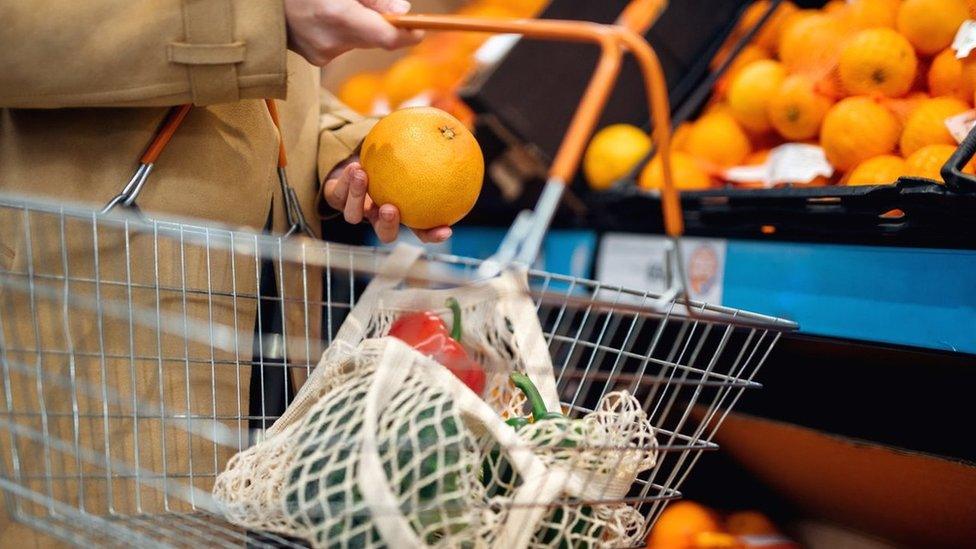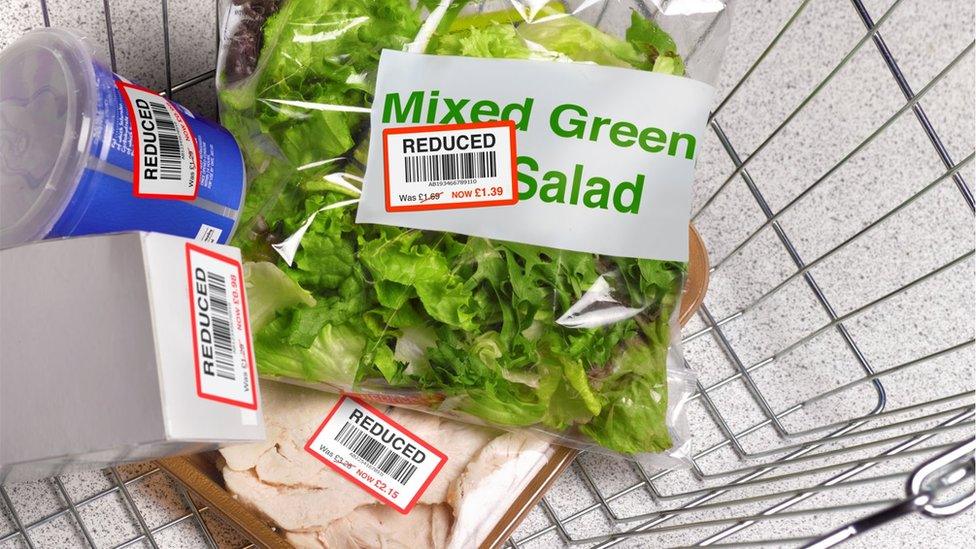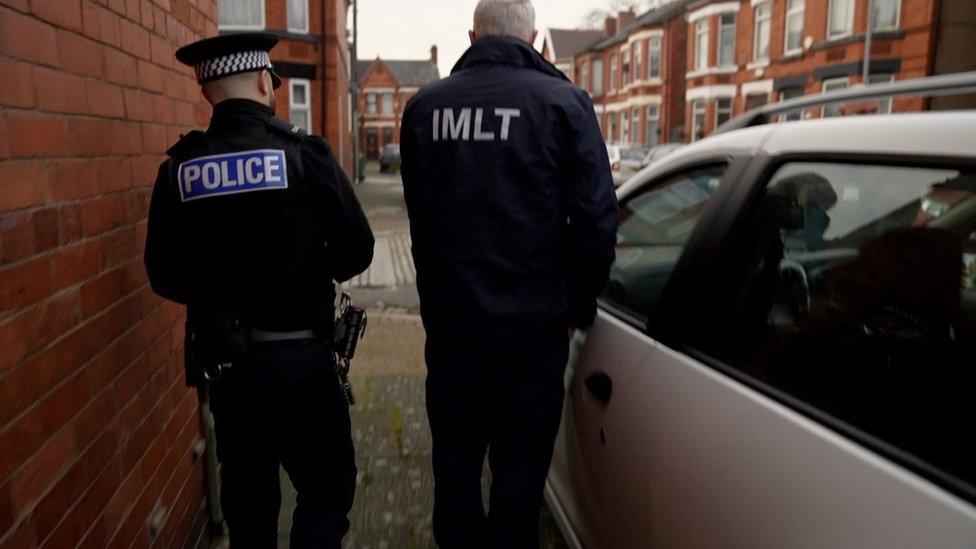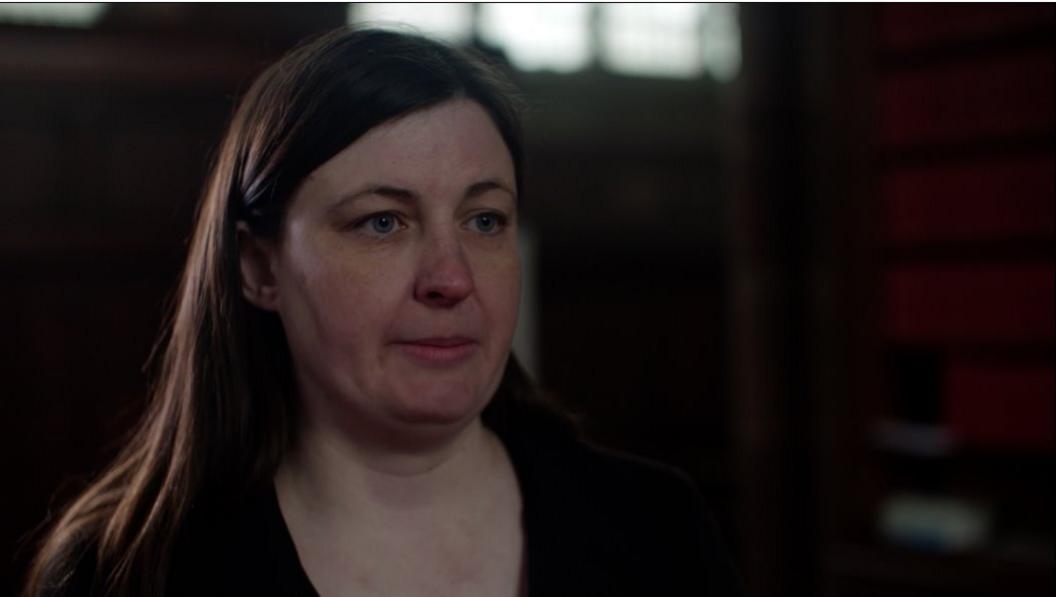Loan sharks trap poorest as cost of living crisis bites
- Published

With price increases on everything from fuel to food making it increasingly tough for households to make ends meet, unlicensed lenders are stepping in, offering loans to the desperate at astronomical interest rates.
"It's just endless," one victim told the BBC.
Small loans from the local money lender to repair the car or afford Christmas were a fact of life for her family - but "it just spirals", said Kim, who asked the BBC not to use her real name.
"It becomes stressful. You know you work hard for that money and you're paying these huge amounts back when you might have only had a small loan, but you know you're paying double back to them."

"Kim" asked to be interviewed anonymously
At one point, Kim and her partner, who live in north-west England, had four loans from the same unlicensed lender and were paying more than half of their net income in interest.
The lender would turn up at the house at 07:30 when the children were still in bed. There were constant messages on social media, the lender knew when payday was, and Kim feared she would pursue her at her workplace.
Who borrows?
With people unwilling to talk about debt, there is little data about unlicensed lenders - but the right-leaning think-tank, the Centre for Social Justice (CSJ), last year commissioned research from the Opinium polling company.
Researchers questioned a representative sample of 3,363 people in England. Of these, 81 (about one in 40) were at the time borrowing from unlicensed lenders.
Matthew Greenwood, CSJ's acting head of debt, told the BBC the implications of the research are huge: "We think there are about a million people in England borrowing from an illegal lender at the moment. Overwhelmingly, people borrow when they're desperate.
"They borrow to fund everyday costs of living, such as a gas bill or electric bill, things as small as a pram, and then they get exploited by those people who seek to extort them for as much money as they can get out of them, offering arbitrary terms, little to no paperwork and an extortionate rate of repayment."

The CSJ report, external highlights separate data from 1,252 victims, questioned last year by the Illegal Money Lending Team, which prosecutes loan sharks in England.
The figures suggest the borrowers are often among the poorest in society:
62% had an income below £20,000 - and of these about half were on less than £15,000
66% already owed money to legal creditors
75% claimed benefits
65% had a long-term health condition
The report highlights more figures from the Illegal Money Lending Team, which show in the last six years just 327 loan sharks have been arrested.
The BBC filmed with the team during a raid on a house in north-west England last week. There was one arrest and the property was searched.

Police and Illegal Money Lending Team investigators raided a house in this street
"We are very concerned that we may see an increase with the pressures of the rising cost of living," said lead investigator Tony Quigley. "But what I would say to people is that no matter how difficult it is, please don't use a local moneylender, because it really is jumping out of the frying pan into the fire."
As in Kim's case, he says it's common for debts of a few hundred pounds to spiral into thousands when lenders apply excessive interest.
Threats can turn into real violence in some cases, he says: "We've seen loan sharks that have kidnapped individuals and we've even seen loan sharks go as far as rape."
'Despair'
His colleague Cath Williams says the effect on victims of spiralling debt, along with manipulation and bullying from lenders, can be traumatic.
"People do get to the depths of despair where they think there's no way out and unfortunately, we have seen people where they have actually tried to take their own life."
Loan sharks have long operated on housing estates in poorer areas, but increasingly use social media to drum up business and threaten clients, says Ms Williams: "It means a loan shark based in Rotherham can lend money in Dorset and London and Norfolk, and those victims are never going to meet up and have a conversation and realise what's going on...it makes people even more isolated."

Cath Williams says loan sharks can drive victims to the depths of despair
The CSJ wants the Illegal Money Lending Team scaled up, with its funding at least doubled in order to investigate and prosecute loan sharks more effectively - currently it has a staff of 50 and an annual budget of £6.5m.
Other recommendations include:
more custodial sentences for those convicted of illegal lending
a national advertising campaign and better financial education on the dangers of loan sharks
efforts to boost non-profit-making credit unions which provide savings and loans to members
For Kim, things came to a head one Christmas when she asked to delay the next payment so she could afford gifts for her children.
When the lender refused, Kim was desperate and tried to contact "head office" but found no record of a loan company which she had been led to believe was legitimate.
Finally, she went to the authorities, the lender was arrested and the family received proper advice on managing their debts.
"I'm very lucky now that as a family we have moved forward from it with a lot of help," she says.
Kim feels guilty that her daughter still remembers times when the family were harassed for money. "But on the other side of it, I think it's a learning curve. I can speak to other people about it and say there is help out there."
Information and support: If you need help with debt, these BBC Action Line links may be helpful. In addition you can contact the Illegal Money Lending Team hotline, external on 0300 555 2222.